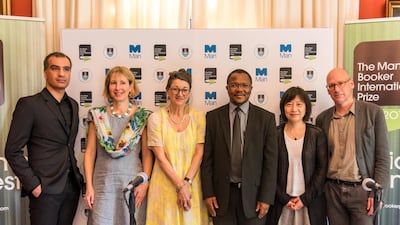The biennial £60,000 (Dh325,450) Man Booker International Prize – whose shortlist was announced last week at the University of Cape Town – rewards a living author who has published fiction either originally in English or whose work is available in English translation. The prize is chosen by the panel of judges, with nominations by previous judges and winners of both the Man Booker and the International competition; publishers are not allowed to nominate.
The last three prizes were won by North American authors: Lydia Davis, Philip Roth, and Alice Munro. The 2007 prize was won by the Nigerian Chinua Achebe, who also wrote in English. Only the initial prize has so far been won by a translated author: the Albanian Ismail Kadaré in 2005. Recently, shortlists have become more diverse. In 2005 eight of the 15 nominees were writers in English. In 2007 it was 11, in 2009, seven, and in 2011 eight out of 13. In 2013, the number of nominees went down, but seven of the 10 nominations were for writing in translation, with eight out of 10 this year. “It’s fantastic,” Catherine Taylor, the deputy director of English PEN, told me, “to see the prize finally fulfilling its remit.”
What does it mean for an author to be translated into English? Taylor says: "English translations and prizes are definitely all to the good – Hassan Blasim, with his IFFP win last year, for the PEN-supported The Iraqi Christ, opened up further interest in Arabic fiction and his small publisher Comma Press. Likewise, Juan Gabriel Vásquez winning the IMPAC has seen new focus on Colombian writers post-Márquez." It's less well known that, alongside the main prize, the International Man Booker winner may choose a translator of his or her work into English to receive a prize of £15,000.
Nevertheless, Ladbrokes currently has the American writer Fanny Howe currently topping this year’s odds at 7/2, closely followed by Amitav Ghosh (India), the other author writing in English. César Aira (Argentina), Marlene van Niekerk (South Africa), and Hoda Barakat (Lebanon) are tied third.
How can the judges evaluate a list that includes poets, short-story writers, young adult novelists and authors whose achievement is prolific against those whose sparer output belies their significance? Aira has published a staggering 80 books, 63 of them novels. The Argentinian author is known for his playfully experimental, brief works that draw on the techniques of folktale and pulp fiction, and which he claims not to edit.
Ibrahim Al Koni, another prolific author, has written 60 books, only a handful of which are currently available in English. A Tuareg Libyan who lived in Moscow and Warsaw before moving to his current home in Switzerland in 1993, he works in Arabic, the language he learnt to write at the age of 12. Like Al Koni, the Lebanese writer Barakat now lives in Europe (in Paris) and, like Aira, has also worked as a translator.
Howe, like Barakat, declares her writing feminist. Four of the 10 shortlisted writers are women, though it could be even easier for a translation prize to be skewed towards male writers, as only about 25 per cent of contemporary fiction in translation published in the English-language market last year was written by women, despite most countries publishing the writing of both sexes in more or less equal numbers.
It’s interesting to find how many shortlistees are published by independents, confirming these presses’ vital role in bringing translation to a wider audience. Aira is known for dividing his enormous output between a variety of small publishers, not only in Argentina but across South America. Barakat’s works have been published by a number of university presses in the United States, as well as Interlink, whose purpose is to bring writing that is well-known outside the English-speaking world to English-language readers. Ghosh, who writes in English and divides his time between Goa, Calcutta and Brooklyn, is perhaps the candidate most published by larger houses, notably Picador, and John Murray.
This year’s shortlistees include writers from six places never before included in the prize: Libya, Mozambique, Guadeloupe, Hungary, South Africa and Congo. Some, including Al Koni, Ghosh and Barakat, have lived in Europe for some time. Maryse Condé, Alain Mabanckou (both writing in French) and Ghosh live part-time in the US, and hold, or have held, posts at US universities. Barakat writes primarily in Arabic, but also in French. It is perhaps increasingly difficult to assign some of these authors to the single nationality they represent on the shortlist, as they live, work and sometimes write across different languages, countries and cultures.
Who would I like to see on the list for 2017? Among my nominations might be Anne Carson (Canada), Can Xue (China), Elena Ferrante (Italy), Felicitas Hoppe (Germany) who, with only one tiny work in translation, could stand a wider English-language readership, Deborah Levy (the United Kingdom) and Chris Kraus (US), but, as this year’s chair of judges, Professor Marina Warner, said: “Fiction can enlarge the world for us all and stretch our understanding and our sympathy.” The true joy of the list is to be introduced to authors I’ve never read before.
• The winner of the 2015 prize will be announced on May 19.
Joanna Walsh is a UK-based writer. She edits fiction at 3:AM magazine and runs @read_women.

